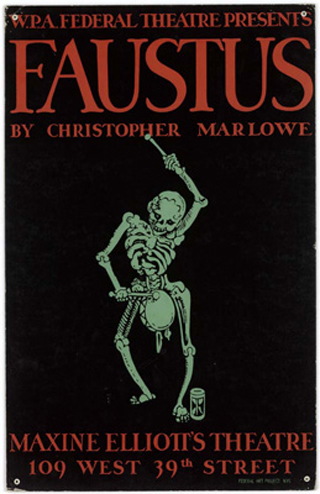
A silkscreen poster for the 1937 WPA Federal Theater's production of The Tragical History of Doctor Faustus by Christopher Marlowe. (Image courtesy of the U.S. Library of Congress.)
Instructor(s)
Prof. Shankar Raman
MIT Course Number
21L.703
As Taught In
Fall 2003
Level
Undergraduate
Course Description
Course Features
Course Description
Shakespeare "doth bestride the narrow world" of the English Renaissance "like a colossus," leaving his contemporaries "walk under his large legs and peep about" to find themselves in "dishonourable graves." This course aims in part to correct this grave injustice by surveying the extraordinary output of playwrights whose names have largely been eclipsed by their more luminous compatriot: Marlowe, Jonson, Webster, and Ford, among others. Reading Shakespeare as just one of a group of practitioners -- many of whom were more popular than him during and even after his remarkable career -- will restore, I hope, a sense not just of the richness of English Renaissance drama, but also that of the historical and cultural moment of the English Renaissance itself. This course will examine the relationship between theatre and society through the lens of the drama produced in response to these changes. However, we will not try to map the progress of drama directly onto the social world, as if the former can simply read off the latter. Rather, focusing on discrete issues and problems, we will try to understand the ways in which a particular text not only reflects but responds to and shapes aspects of the culture from which it derives, developing an aesthetic that actively engages its world. The topics addressed over the course of the semester will be wide-ranging but will include: gender and class dynamics in Renaissance society; money, trade, and colonialism; the body as metaphor and theatrical "object"; allegory and aesthetic form; theatricality and meta-theatricality; the private and the public.
Other Versions
Other OCW Versions
OCW has published multiple versions of this subject. ![]()


